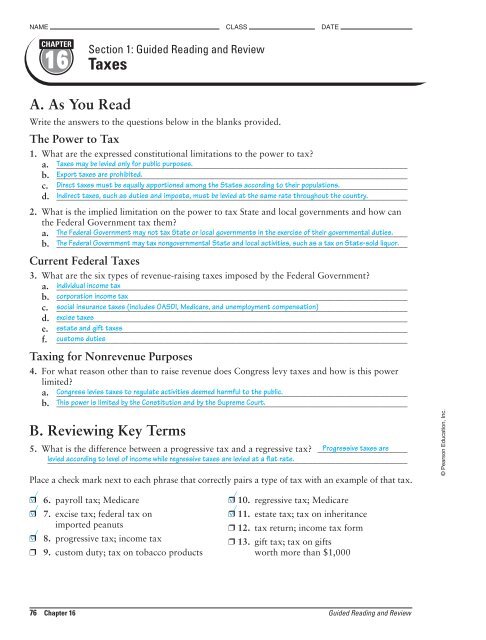0130679593
0130679593
0130679593
You also want an ePaper? Increase the reach of your titles
YUMPU automatically turns print PDFs into web optimized ePapers that Google loves.
NAME CLASS DATE<br />
CHAPTER<br />
16<br />
Section 1: Guided Reading and Review<br />
Taxes<br />
A. As You Read<br />
Write the answers to the questions below in the blanks provided.<br />
The Power to Tax<br />
1. What are the expressed constitutional limitations to the power to tax?<br />
a. ______________________________________________________________________________<br />
Taxes may be levied only for public purposes.<br />
b. ______________________________________________________________________________<br />
Export taxes are prohibited.<br />
c. ______________________________________________________________________________<br />
Direct taxes must be equally apportioned among the States according to their populations.<br />
d. ______________________________________________________________________________<br />
Indirect taxes, such as duties and imposts, must be levied at the same rate throughout the country.<br />
2. What is the implied limitation on the power to tax State and local governments and how can<br />
the Federal Government tax them?<br />
a. ______________________________________________________________________________<br />
The Federal Government may not tax State or local governments in the exercise of their governmental duties.<br />
b. ______________________________________________________________________________<br />
The Federal Government may tax nongovernmental State and local activities, such as a tax on State-sold liquor.<br />
Current Federal Taxes<br />
3. What are the six types of revenue-raising taxes imposed by the Federal Government?<br />
a. ______________________________________________________________________________<br />
individual income tax<br />
b. ______________________________________________________________________________<br />
corporation income tax<br />
c. ______________________________________________________________________________<br />
social insurance taxes (includes OASDI, Medicare, and unemployment compensation)<br />
d. ______________________________________________________________________________<br />
excise taxes<br />
e. ______________________________________________________________________________<br />
estate and gift taxes<br />
f. ______________________________________________________________________________<br />
customs duties<br />
Taxing for Nonrevenue Purposes<br />
4. For what reason other than to raise revenue does Congress levy taxes and how is this power<br />
limited?<br />
a. ______________________________________________________________________________<br />
Congress levies taxes to regulate activities deemed harmful to the public.<br />
b. ______________________________________________________________________________<br />
This power is limited by the Constitution and by the Supreme Court.<br />
B. Reviewing Key Terms<br />
5. What is the difference between a progressive tax and a regressive tax? ____________________<br />
Progressive taxes are<br />
________________________________________________________________________________<br />
levied according to level of income while regressive taxes are levied at a flat rate.<br />
Place a check mark next to each phrase that correctly pairs a type of tax with an example of that tax.<br />
<br />
<br />
❒<br />
❒<br />
<br />
❒<br />
❒<br />
6. payroll tax; Medicare<br />
7. excise tax; federal tax on<br />
imported peanuts<br />
8. progressive tax; income tax<br />
9. custom duty; tax on tobacco products<br />
<br />
❒ 10. regressive tax; Medicare<br />
❒<br />
11. estate tax; tax on inheritance<br />
❒ 12. tax return; income tax form<br />
❒ 13. gift tax; tax on gifts<br />
worth more than $1,000<br />
© Pearson Education, Inc.<br />
76 Chapter 16 Guided Reading and Review


